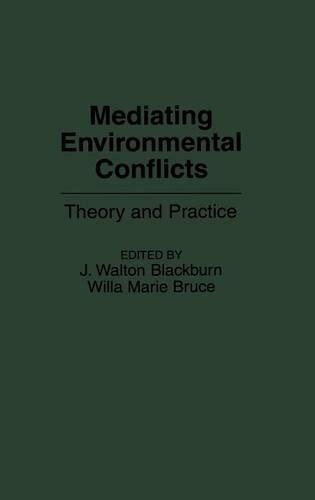
Mediating Environmental Conflicts: Theory and Practice
(Hardback)
Publishing Details
Mediating Environmental Conflicts: Theory and Practice
By (Author) Willa M. Bruce
By (author) J. Walton Blackburn
Bloomsbury Publishing PLC
Praeger Publishers Inc
13th June 1995
United States
Classifications
Professional and Scholarly
Non Fiction
The environment
333.7
Physical Properties
Hardback
320
Description
Environmental conflicts are increasing in number and intensity, demanding new approaches to dispute resolution such as environmental mediation. This book contains the expertise of 28 specialists; stresses the need for mediated dispute resolution as an alternative to litigation; calls for a communitarian approach; explores conceptual foundations and conflicts resistant to mediation; and answers How do we know what we know Addresses training mediators; discusses special problems of small communities, value of citizen participation, and EPA regulatory negotiation; explores ethics and social justice; and considers future challenges and issues confronting theory and practice. Case studies analyze nuclear waste siting, highway design, wilderness designation, field burning, and Environmental Impact Statement development. Intended for alternative dispute resolution practitioners, scholars, and citizen environmentalists. Authors provide insights from many academic disciplines and practical experience. Reed advocates creating sustainable communities; O'Leary calls for new research; Maida contends that law and economics offer viable perspectives; and Allen prescribes mediation training. Dworkin and Jordan contribute a teaching case; Klase addresses problems in rural areas; and the Burgesses offer steps to make difficult confrontations constructive. Clary and Hornney argue that prenegotiation and negotiation are essential; Richardson describes facilitated negotiation; and Bogdonoff explains negotiated rule-making in Maine. Stephens, Stephens, and Dukes suggest that ethical considerations are due the environment; Blackford and Matunga advise sensitivity to cultural differences; Ryan demonstrates the utility of conflict management by the EPA. Wood and Guy describe how local governments can achieve consensus; and Baird, Maughan, and Nilson offer reasons mediation failed in Idaho. Mangerich and Luton describe an urban-rural conflict in Washington state, and Blackburn provides his Eclectic Theory to guide future research.
Author Bio
J. WALTON BLACKBURN is an independent consultant in participative strategic planning. He teaches Political Science at the University of Nebraska and has over 15 years of experience in community, regional, and university planning. His work on environmental mediation has been published in the Policy Studies Journal, and he has chapters in two books including, M. Afzalur Rahim (editor), Theory and Research in Conflict Management (Praeger, 1990). He coauthored, with Willa Bruce, a previous book Balancing Job Satisfaction and Performance (Quorum, 1992). WILLA MARIE BRUCE is a Professor at the University of Nebraska at Omaha where she teaches Administrative Ethics, Organizational Behavior, and Organizational Development. She is on the editorial boards of Public Administrative Review and Public Voices, and is listed in Who's Who of American Women, 1992 and 1993. She has published in numerous professional journals, and has published three previous books with Quorum: Problem Employee Management (1990) with Christine M. Reed, Dual-Career Couples in the Public Sector (1991) and with J. Walton Blackburn, Balancing Job Satisfaction and Performance (1992).
